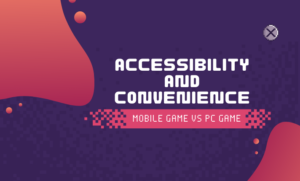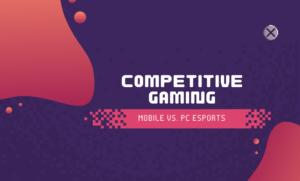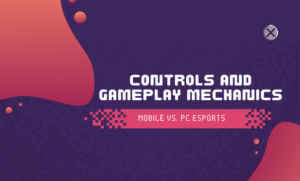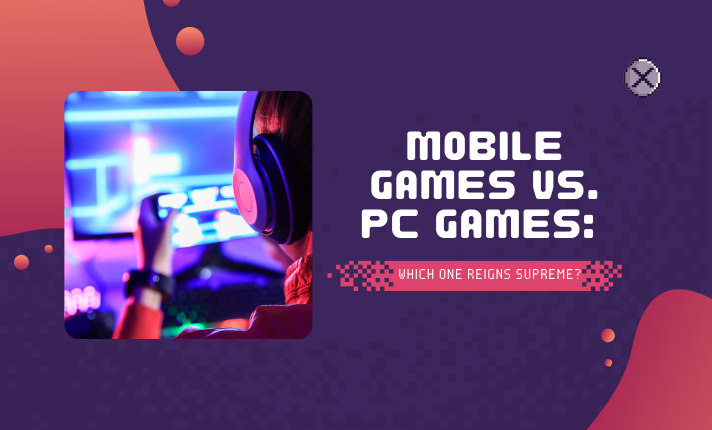In today’s digital era, the gaming industry has grown exponentially, offering players a wealth of options tailored to various preferences and lifestyles. Among these choices, the debate of mobile games vs PC games has become a hot topic. Each platform brings unique advantages and challenges, shaping the gaming experience in distinct ways. From accessibility and cost to performance and community, this blog delves into the key aspects of the ongoing rivalry to determine which platform might hold the crown.

The Popularity Contest: Mobile Game vs PC Game
The first question that comes to mind is “Which platform is more popular?” Because cellphones are so widely available, the popularity of mobile gaming has skyrocketed. On the other hand, PC games have a rich history and a loyal fan base built over decades.
PUBG Mobile and Candy Crush Saga are two examples of mobile games that have billions of downloads worldwide.With the casual gaming trend on the rise, mobile games attract a broad audience, including non-gamers.
PC games, however, dominate in the realm of high-end gaming experiences. Titles like “League of Legends” and “Counter-Strike” have defined competitive gaming and esports, creating a culture of their own. The popularity of each platform depends on the type of gamer and their preferences.

Accessibility and Convenience
When discussing mobile games vs PC games, accessibility is a significant factor. Mobile games triumph in this category due to the sheer number of people owning smartphones. You can play anywhere, anytime, without the need for bulky equipment. This convenience makes mobile gaming appealing to casual gamers and commuters.
PC games, while less portable, offer unparalleled flexibility in terms of hardware and software customization. Enthusiasts can build custom rigs tailored to their needs, ensuring optimal performance and longevity. However, this approach compromises accessibility and necessitates a more challenging learning curve.

Graphics and Performance: A Key Comparison
The gaming experience is heavily influenced by graphics and performance. PC games have consistently been at the forefront in this regard. High-resolution displays, advanced GPUs, and immersive settings like ray tracing make PC gaming visually superior.
Mobile games have made tremendous strides in graphics, thanks to powerful processors and optimized engines. Games that display console-like quality on a small screen include “Genshin Impact” and “Call of Duty Mobile.” However, the compact form factor and limited hardware of smartphones still fall short of matching a dedicated gaming PC.

Game Library: Quantity vs. Quality
Another important consideration is the range of available games. Mobile platforms like Android and iOS host millions of games across various genres, from hyper-casual to multiplayer online battle arenas (MOBAs). The sheer volume ensures there’s something for everyone.
PC games, while fewer in number, offer unparalleled depth and complexity. From intricate strategy games like “Civilization” to massive open-world RPGs like “The Witcher 3,” the PC gaming library caters to hardcore gamers looking for immersive experiences.

Cost Considerations: Which One’s More Affordable?
Cost is a pivotal factor in the mobile game vs PC game debate. Mobile games are generally free-to-play, with revenue models based on ads and in-app purchases. This makes them accessible to a wider audience without upfront costs.
PC gaming, on the other hand, requires a substantial initial investment in hardware. High-end PCs and gaming accessories can cost thousands of dollars, not to mention the price of individual games. However, PC gamers argue that the superior experience justifies the expense.

Competitive Gaming: Mobile vs. PC Esports
Both platforms contribute to the billion-dollar industry of esports. Mobile esports, though relatively new, has gained traction with games like “PUBG Mobile” and “Free Fire.” These tournaments attract millions of viewers and hefty prize pools.
PC esports, however, remain the cornerstone of competitive gaming. With well-established leagues, sizable events, and devoted fan bases, games like “Dota 2” and “CS: GO” rule the scene. The infrastructure for PC esports is more developed, making it the preferred choice for professional gamers.

Controls and Gameplay Mechanics
Controls play a vital role in gaming. Mobile games are designed with touchscreen inputs, which are intuitive but can feel limiting for complex games. Some mobile gamers use external controllers, but this diminishes the platform’s portability advantage.
PC games excel in this area with a keyboard-and-mouse setup that offers precision and versatility. Customizable controls and the ability to connect various peripherals make PC gaming a haven for those seeking complex gameplay mechanics.

Social Connectivity: Multiplayer Experiences
The social aspect of gaming has evolved significantly over the years, making multiplayer experiences a central part of both mobile and PC games. Mobile games excel in delivering casual multiplayer experiences that allow players to connect with friends and family effortlessly. Titles like “Among Us” and “Clash Royale” have gained immense popularity for their simplicity and ease of access, enabling players to join games with minimal setup. The portability of mobile devices further enhances these social interactions, allowing users to play and socialize on the go.
On the other hand, PC games elevate social connectivity by offering robust multiplayer infrastructures. Features such as dedicated servers, customizable clan systems, and integrated voice chat create an environment that caters to both casual and competitive players. Games like “World of Warcraft” and “Counter-Strike: Global Offensive” have long fostered tight-knit communities, where teamwork and strategy play a crucial role in the gaming experience. Additionally, PC gamers often use third-party platforms like Discord to build and maintain social networks beyond the games themselves.
Both platforms have carved out unique niches in the multiplayer domain. While mobile games prioritize convenience and accessibility, PC games focus on depth and community building. The choice between the two depends on whether a player values quick, casual connections or more immersive and strategic collaborations.
The social aspect of gaming is more prominent than ever. Mobile games excel in casual multiplayer experiences, allowing friends to connect and compete effortlessly. Games like “Among Us” and “Clash Royale” thrive on their accessibility and social features.
PC games enhance social connectivity through features such as voice chat, dedicated servers, and clan systems. They cater to both casual and competitive players, fostering long-term community engagement.

Updates and Content Longevity
Sustained content and regular updates are essential for preserving player engagement. Mobile games excel at rapid updates and seasonal content due to their lightweight structure and shorter development cycles. This keeps players engaged with fresh content.
PC games, while slower in updates, often focus on substantial expansions and high-quality patches. Games like “World of Warcraft” and “Skyrim” remain relevant for years due to their expansive worlds and modding communities.
Monetization Models: Pay-to-Win or Fair Play?
The monetization strategies of mobile games and PC games vary greatly, shaping the player experience in distinct ways. Mobile games frequently adopt the free-to-play model, relying on microtransactions for revenue. Players often encounter options to buy in-game currency, power-ups, or exclusive items, which can lead to “pay-to-win” scenarios. This approach frustrates many users who feel that spending money is necessary to remain competitive. For instance, games like “Clash of Clans” and “Candy Crush” generate significant revenue through such purchases, yet this model often prioritizes profit over balanced gameplay.
Also Read: What Is Everygame Casino
PC games, by contrast, generally involve an upfront cost, whether purchasing the game outright or subscribing to a service. While microtransactions also exist in PC gaming, they are typically limited to cosmetic enhancements or optional expansions. This guarantees a fair competition where players prioritize skill and strategy over financial resources. Additionally, PC gamers often benefit from community-created content such as mods and free updates, further enhancing value without additional costs.
Both monetization models have their merits and downsides. Mobile games’ accessibility and affordability come at the cost of potentially unbalanced gameplay. Meanwhile, PC gaming’s higher initial investment often translates into a fairer and more immersive experience. Choosing between the two depends on individual preferences and gaming priorities.
The monetization strategies of mobile games vs PC games are vastly different. Mobile games often rely on microtransactions, which can lead to pay-to-win scenarios. This frustrates players who feel forced to spend money to stay competitive.
PC games, though more expensive upfront, usually avoid aggressive monetization tactics. Paid expansions and cosmetic items are common, but they rarely impact gameplay balance. This model appeals to gamers who value fairness.
Hardware Requirements and Maintenance
Hardware requirements and maintenance are pivotal considerations in the mobile games vs PC games debate. PC gaming demands a significant investment in specialized hardware. Gamers often need powerful processors, high-performance graphics cards, and substantial RAM to ensure smooth gameplay, especially for resource-intensive titles. Over time, maintaining a gaming PC involves regular updates, including software patches and hardware upgrades, which can be both time-consuming and costly. Dust buildup, component wear, and occasional troubleshooting also contribute to the upkeep.
Mobile games, on the other hand, thrive on the widespread availability of smartphones. Most modern smartphones come equipped with sufficient processing power to handle popular mobile games without requiring additional hardware. This accessibility is one of the main draws of mobile gaming. However, mobile devices aren’t exempt from challenges; overheating, battery drainage, and the need for frequent software updates can affect performance. Additionally, as mobile games evolve, older devices may struggle to keep up, pushing users to upgrade their phones sooner than anticipated.
In terms of longevity, PC gaming systems often allow for incremental upgrades, extending their usability. Mobile devices, by contrast, have a shorter lifespan due to rapid technological advancements. Ultimately, the choice between the two depends on the gamer’s budget, preferences, and willingness to engage in regular maintenance.
PC games require powerful hardware and regular maintenance to ensure smooth performance. Upgrading components like GPUs and CPUs can be expensive but is necessary for running the latest games.
Mobile games, by contrast, require no additional hardware beyond a smartphone. However, the rapid pace of technological advancements means older devices may struggle to run new games, leading to frequent upgrades.
Community and Fan Culture
The community and fan culture surrounding mobile and PC gaming play a significant role in shaping the gaming experience. Mobile games, with their widespread accessibility, have cultivated massive, diverse player bases. Social media platforms like Instagram and Twitter often host thriving communities centered around popular mobile games like “Clash of Clans” and “Candy Crush.” These communities emphasize quick interaction and sharing tips, memes, and strategies.
PC gaming communities, however, delve deeper into creating lasting and impactful fan cultures. Platforms like Reddit, Discord, and Steam host forums and discussion boards dedicated to specific games or genres. PC gamers also produce an extensive range of fan-created content, including mods, custom levels, and even spin-off games, which add depth and longevity to the gaming experience.
Moreover, the eSports and streaming scene has further solidified PC gaming’s community-driven culture. Streamers on platforms like Twitch and YouTube build tight-knit communities around games like “League of Legends” and “Minecraft,” engaging millions of fans daily. These fan bases often participate in live discussions, tournaments, and collaborative projects.
In contrast, while mobile games generate vibrant and casual interactions, they rarely achieve the depth of PC gaming cultures. The choice between the two depends on whether a gamer seeks quick, casual engagement or a more immersive, community-driven experience. sense of community plays a significant role in the gaming experience. Mobile games often have vibrant online communities but lack the depth and history of PC gaming culture. Fan-created content, mods, and forums are hallmarks of the PC gaming community.
PC gaming communities have a more established presence, with dedicated platforms like Steam and Reddit fostering discussions, reviews, and collaborations. This enriches the overall gaming experience.
The Future of Gaming: What Lies Ahead?
The future of gaming is exciting for both platforms. Mobile games are leveraging cloud gaming and 5G to enhance performance and graphics, narrowing the gap with PCs. PC gaming, meanwhile, is embracing virtual reality (VR) and augmented reality (AR) to deliver cutting-edge experiences.
While mobile gaming’s accessibility ensures continued growth, PC gaming’s ability to push technological boundaries keeps it at the forefront of innovation. The ultimate winner will depend on individual preferences and the evolving gaming landscape.
What is the cost difference between mobile and PC gaming?
When comparing the cost of mobile gaming and PC gaming, affordability is a crucial factor to consider. Mobile games often come with the advantage of being free-to-play, attracting a massive audience without requiring an upfront investment. These games primarily rely on monetization models like ads and microtransactions, allowing players to access basic gameplay without spending money. However, frequent in-app purchases for cosmetic items, power-ups, or additional features can add up over time.
On the other hand, PC gaming is known for its higher initial costs. Building or purchasing a gaming PC can cost anywhere from a few hundred to several thousand dollars, depending on the specifications and desired performance level. Additional expenses include monitors, peripherals, and games, which often have a one-time purchase price. That said, PC gamers often justify these costs by pointing to the enhanced graphics, gameplay depth, and overall experience.
In conclusion, the battle of mobile games vs PC games is one of personal preference. Each platform has its strengths and weaknesses, catering to different types of gamers. Whether you’re a casual player or a hardcore enthusiast, the choice is yours to make.
FAQ
Are PC games better than mobile games?
It depends on your priorities. PC games offer superior graphics, performance, and depth, while mobile games excel in accessibility and convenience.
Why are mobile games more popular?
Mobile games are more popular due to their accessibility, affordability, and casual nature, attracting a broader audience.
Can mobile games match PC games in quality?
While mobile games are improving rapidly, they still lag behind PC games in terms of graphics, complexity, and performance.
Which platform is better for competitive gaming?
PC gaming is better for competitive esports due to its established infrastructure and superior controls, though mobile esports is growing.













